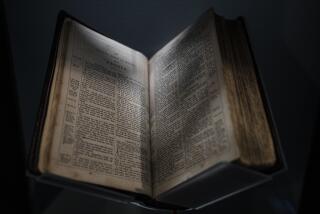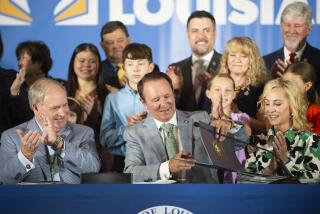Justices Debate ‘God’ in Pledge
WASHINGTON — The Supreme Court on Wednesday debated whether the words “under God” transform the Pledge of Allegiance from a daily display of patriotic unity into a form of state indoctrination in a religious belief.
Dr. Michael Newdow, the California father who won an appeals court ruling declaring the pledge unconstitutional, represented himself before the justices, and insisted the reference to God must go.
“I am an atheist. I don’t believe in God. And every school morning, my child is asked to stand up, face that flag, put her hand on her heart and say that her father is wrong,” he said. “The government is supposed to stay out of religion,” said Newdow, who is both a doctor and a lawyer.
Outside, hundreds of people gathered in front of the court building -- some surrounding ministers who spoke of the role of God in the nation’s life, others quietly voicing support for Newdow.
Despite his surprisingly strong performance before the high court, Newdow’s chances of winning his argument remain slim. In their questions and comments, most of the justices sounded as though they would like the case to just go away.
In fact, the court might rule that Newdow does not have standing to challenge the public school recitation of the Pledge of Allegiance. To have standing to contest a government practice as unconstitutional, the challenger must show he has been personally hurt by it.
Justice Anthony M. Kennedy questioned whether Newdow met that standard. His daughter, Kennedy noted, does not object to saying the pledge as it is; and her mother, who has custody, supports the inclusion of the words “under God.”
If most of the justices take that view, they could throw out Newdow’s case. However, such a ruling would not resolve whether the use of “under God” in the pledge is constitutional.
Another option would be to rule that the mention of God is not the same as a state-sponsored school prayer -- which the high court banned in 1962.
“We have so many references to God. The words ‘In God We Trust’ on coins,” said Justice Sandra Day O’Connor. “No child is being required to say a prayer,” she said.
U.S. Solicitor Gen. Theodore B. Olson and a Sacramento school attorney pressed the same argument. The pledge is “a ceremonial, patriotic exercise,” not a call to religious faith, Olson said.
Moreover, the reference to God in the pledge may be seen as stating the common belief that the nation was founded by those who believed in God, said Chief Justice William H. Rehnquist. “It’s descriptive,” he said. “You can agree with it or not, but that doesn’t make it a prayer.”
Newdow did not agree. “It’s an affirmation of religious belief,” he said.
The court has prohibited the posting of the Ten Commandments in classrooms and teaching of creationism, he pointed out. Neither of those involves prayer, yet the court struck them down because they amounted to the government promoting a religious belief in the classroom, Newdow said.
The Pledge of Allegiance to the U.S. flag was written in 1892. At the height of the Cold War in 1954, Congress changed it to counter the “godless communism” espoused by the Soviet Union. The phrase “one Nation indivisible, with liberty and justice for all” was changed to “one Nation under God, indivisible, with liberty and justice for all.”
Justice Stephen G. Breyer ventured that the phrase may refer to a “supreme being,” not a particular god. “It’s generic [and] comprehensive,” he suggested, not directly affirming one religious view or one god.
Newdow would not budge. “I don’t think you can say ‘under God’ means no God,” he responded.
Still another option would have the court uphold the pledge on the grounds that in reciting it, no child is required to utter the words “under God.” In 1943, the Supreme Court ruled that children of Jehovah’s Witnesses in West Virginia could not be required to salute the flag. That ruling was cited several times during Wednesday’s argument.
“There’s an option here. The child does not have to say it at all,” said Justice Ruth Bader Ginsburg.
Once again, Newdow disagreed. Young children are not likely to object when their teacher leads the class in saying the pledge, he said, and they should not be required to identify themselves as outsiders and dissenters, he added.
Then it was Justice David H. Souter’s turn. He suggested the words “under God” are hardly noticed by most people, including children. “This is so tepid, so diluted, so far from compulsory prayer that it is beneath the constitutional radar,” he commented.
In the end, only Justice John Paul Stevens sounded as though he was leaning in favor of Newdow. Stevens supports a strict separation of church and state, and regularly votes against government policies that promote or subsidize the teaching of religion.
Justice Clarence Thomas did not participate in the questioning.
Still, it is not clear what view will win a majority. Only eight justices will decide the case, Elk Grove Unified School District vs. Newdow. Since Justice Antonin Scalia commented on the dispute at a public rally sponsored last year by the Knights of Columbus, he agreed to recuse himself from the case.
That means Newdow could prevail on a 4 to 4 vote. If the justices are evenly divided, they will not issue a true ruling, but instead will announce that the decision of the U.S. 9th Circuit Court of Appeals is affirmed.
That in turn would mean it was unconstitutional for school districts in California and eight other Western states -- those that fall in the 9th judicial circuit -- to recite the words “under God” in the Pledge of Allegiance. The rest of the nation would be free to continue as usual.
But after Wednesday’s argument, it sounded as though a solid majority of the justices will try to agree on a ruling that either throws out Newdow’s claim or upholds the pledge as a patriotic exercise, not a religious affirmation.
A ruling will come soon if the court is evenly split or is determined to deny standing to Newdow. However, if the justices set out to write an opinion resolving the matter, a ruling is not likely until late June.
Newdow had never practiced law, but didn’t appear intimidated by sharp questioning from the justices. At one point he bantered with Rehnquist about whether the addition of “under God” to the pledge was unifying or divisive.
What was the vote in Congress in 1954? Rehnquist asked.
“It was apparently unanimous. There was no objection,” Newdow replied.
“Well, that doesn’t sound divisive,” Rehnquist said to scattered laughter.
“Only because no atheist can get elected to public office,” Newdow replied to applause.
More to Read
Get the L.A. Times Politics newsletter
Deeply reported insights into legislation, politics and policy from Sacramento, Washington and beyond. In your inbox three times per week.
You may occasionally receive promotional content from the Los Angeles Times.











